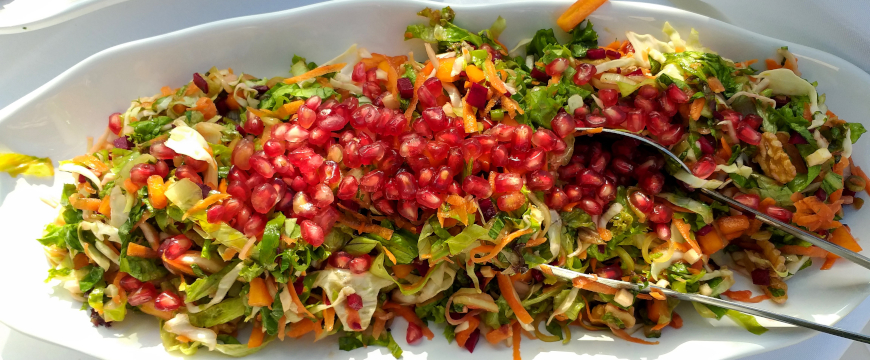Ranked the “Best Diet Overall” by U.S. News & World Report for the 7th year in a row in 2024, the Mediterranean diet’s health benefits are well known. But what exactly is this diet, and can everyone follow it? Harvard Professor Frank Hu has suggested that fusing it with a traditional Asian diet may make the Mediterranean diet more beneficial to more people.
Dr. Frank Hu* introduced and compared traditional Mediterranean and Asian diets at the 2nd Annual Cretan Lifestyle: Mediterranean Tradition & Modern Applications Experiential Conference at Grecotel in Rethymno, Crete, Greece, in November 2023.
In the conference’s first session, Hu discussed the way “East meets West” for “Lessons in Longevity” from Crete, Greece, and Okinawa, Japan. He introduced the Mediterranean (Med) diet as a healthy dietary pattern characterized by a “high intake of plant-based foods (fruits and vegetables, legumes, nuts, and OLIVE OIL)” and “moderate intake of dairy, fish, poultry,” but “low in red meat, sweets and highly processed food.”
Hu then went on to consider Crete as “the birthplace of the Med diet,” where traditional dietary patterns “capture the essence of the Med diet,” with especially low rates of coronary heart disease “and some cancers, as well as one of the highest adult life expectancies” when it was part of Dr. Ancel Keys’s Seven Countries Study in the middle of the 20th century.
Referring to a 2022 Journal of the American College of Cardiology article about olive oil and mortality that he co-authored, Hu attributed some of the diet’s health benefits to Cretans’ “long-standing tradition of using olive oil,” which he called “a hallmark of [the] traditional Mediterranean diet.” Moreover, Hu pointed out that studies on a wide range of plant based foods and health outcomes linked higher consumption of fruit, vegetables, nuts, olive oil, and coffee to a lower risk of chronic diseases.
Hu went on to present the Traditional Healthy Asian Diet Pyramid, which includes many features of a traditional Mediterranean diet. Acknowledging that traditional Asian diets vary among countries (as Mediterranean diets do), he added that they also have a lot in common. In addition, long-established Asian and Mediterranean diets share such healthy components as plentiful fruit, vegetables, whole grains, legumes, nuts, and oily fish. Asian diets add soy, green tea, fermented vegetables, and seaweed but do not tend to include red wine or olive oil.
A higher consumption of soy, as Hu explained, has been associated with a lower risk of several chronic diseases, such as breast cancer and coronary heart disease. The numerous healthy components of the traditional Asian diet of Okinawa, such as the polyphenols that are also abundant in the Med diet, help explain why there are more centenarians in Okinawa than anywhere else in Japan (and more than in many other countries). The habit of stopping eating when one is 80% full, rather than 100% full, also helps.
Why talk about these two diets together? Hu explained that “one can create a personalized fusion diet using elements from both” Asian and Mediterranean cultures. That is what he does. Such a fusion was studied in the Direct Plus trial, which added Asian elements to a Mediterranean diet and found that those who followed the supplemented fusion diet had healthier brains as they aged, compared with control groups. Hu suggested that several diets could be used alone or in combination to promote healthy aging and longevity, such as the Mediterranean, Okinawa, Planetary health, Nordic, DASH, and Harvard healthy eating plate diet strategies.
In his conclusion, Hu pointed out, “the existence of multiple healthy eating patterns across diverse cultures offers [the] flexibility of combining beneficial elements of East and West dietary traditions to create more personalized diets. This ‘fusion diet’ approach not only amplifies the benefits of diverse dietary strategies to promote healthy aging but also enhances acceptability by broader populations.” This is important, since “adopting a healthy diet along with other lifestyle factors could add 8 to 10 years of life expectancy free from major chronic diseases.”
The Cretan Lifestyle Conference highlighted the significance of a healthy lifestyle as well as healthy eating, focusing largely on the benefits of the traditional Mediterranean way of life, but also recognizing similar advantages from the tried and tested lifestyles of other cultures. An increasing understanding of what makes various traditional diets and ways of life beneficial to humans and the environment can offer more healthy options to the global population.
*Dr. Frank Hu is the Chair of the Department of Nutrition and the Fredrick J. Stare Professor of Nutrition and Epidemiology at Harvard T.H. Chan School of Public Health, and Professor of Medicine at Harvard Medical School and Brigham and Women’s Hospital.
Greek Liquid Gold was a Technical Partner of the Cretan Lifestyle Conference, Cretan Lifestyle: Mediterranean Tradition & Modern Applications. Lisa Radinovsky received complimentary food, lodging, conference registration, and excursions, and was paid to cover the conference as a photo journalist.
All businesses, organizations, and competitions involved with Greek olive oil, the Mediterranean diet, and/or agrotourism or food tourism in Greece, as well as others interested in supporting Greeks working in these sectors, are invited to consider the advertising and sponsorship opportunities on the Greek Liquid Gold: Authentic Extra Virgin Olive Oil website. The only wide-ranging English-language site focused on news and information from the Greek olive oil world, it has helped companies reach consumers in more than 220 countries around the globe.


